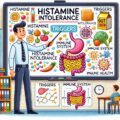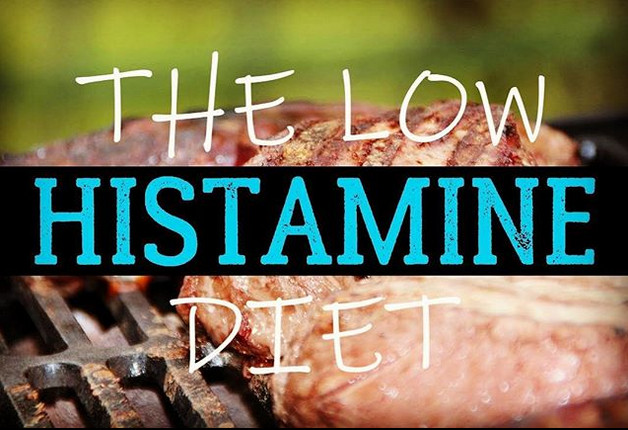Eating Meat Makes Histamine Intolerance Symptoms Worse
 Meat is the star of summer barbecues, the backbone of bacon lovers, and the belle of the burger ball. It sounds appetizing, but if you’re someone with histamine intolerance, meat is more like a backstabbing best friend than a sizzling soulmate. Yes, meat. delicious, juicy, mouthwatering meat, might just be the secret villain behind your allergy symptoms, brain fog, bloating, sleep issues, and that mysterious rash you blame on laundry detergent. Today, we’re diving into why meat and histamine intolerance are like oil and water. Hopefully, by the end, you will see the light and be inspired to make a change!
Meat is the star of summer barbecues, the backbone of bacon lovers, and the belle of the burger ball. It sounds appetizing, but if you’re someone with histamine intolerance, meat is more like a backstabbing best friend than a sizzling soulmate. Yes, meat. delicious, juicy, mouthwatering meat, might just be the secret villain behind your allergy symptoms, brain fog, bloating, sleep issues, and that mysterious rash you blame on laundry detergent. Today, we’re diving into why meat and histamine intolerance are like oil and water. Hopefully, by the end, you will see the light and be inspired to make a change!
Meat Feeds Histamine-Friendly Gut Bacteria
So, you think your gut’s just there to handle last night’s tacos and today’s smoothie? Think again. Your gut is basically the New York City of your body, bustling with bacteria, busy breaking down food, and constantly complaining about the commute. But unlike NYC, it’s not all fun and glamour. Meat can turn your gut’s peaceful metropolis into a scene straight out of a Godzilla movie.
Here’s the scoop: Meat, especially the processed, smoked, aged, or otherwise suspiciously delicious kinds, alters your gut microbiome, leading to an overpopulation of histamine-producing bacteria. It’s like inviting a bunch of pyromaniacs to a fireworks party, things are going to explode, and not in a good way. When these histamine-producing bacteria get to work, they pump out more histamine than your body knows what to do with, leaving you a histamine-ridden mess.
Undigested Meat can Cause Leaky Gut Syndrome
If you have histamine intolerance and think you are digesting all of your meat, think again! The reality is, most people with histamine issues also have low HCL levels in their gut. If you eat meat every day and a portion of it is undigested, it will putrify, which will lead to inflammation. If eat if every day, the inflammation becomes chronic. This then makes the bacterial balance more unfavorable, and leaky gut starts to develop.
Once the leaky gut develops, then a domino effect of food sensitivities starts to occur. Most of the time people them blame these foods as the cause of their problems when the actual root cause is the undigested meat. I know it may sound a little far out, but trust me, I have seen a lot of clients who made big progress after eliminating meat.
DAO Levels Lower from Eating Meat
DAO is your body’s histamine-fighting enzyme. Think of DAO as the nightclub bouncer for your body, it keeps histamine from crashing the party. But here’s the problem: Meat has a way of bribing the bouncer. Yep, some compounds in meat, especially the kind that’s been hanging around too long (we’re looking at you, ground beef and aged steak), can inhibit DAO. Eating aged steak is like giving the bouncer (DAO) a roofie. After the bouncer is passed out, the histamine is released from pandoras box and the problems ensue.
DAO levels can be assisted from supplements like magnesium, vitamin C and B6. Though these supplements can be helpful, I have found one strategy that beats them all: DON’T GET TRIGGERED. If you don’t eat foods that trigger you, you won’t have the reactions that DRAIN the DAO stored in your body. This is one of the main reasons people have low DAO levels, because they are constantly being triggered by something they are ingesting or inhaling.
Mast Cells are Triggered by Meat Consumption
Mast cells are like that one friend who freaks out every time they get a text from an unknown number. They’re always ready to go full drama mode, releasing histamine like it’s the latest gossip. Meat doesn’t help this situation. In fact, it’s like giving your drama-prone friend a megaphone and a spotlight. Smoked, aged, and processed meats are loaded with histamine, which can directly trigger mast cells to release histamine. In addition, meat feeds the histamine-producing bacteria in your gut. Your immune system doesn’t stand a chance; it’s like trying to keep yourself calm in a room full of toddlers hopped up on sugar.
Meat Acts Like a Histamine Bomb
Not all meat is created equal. Some types are like little histamine bombs just waiting to go off. Aged meats, like that fancy prosciutto or the salami you thought would class up your sandwich, are some of the worst offenders . They’re like the tequila shots of the histamine world: they seem like a great idea until you wake up regretting everything. Just as bad as aged meat are things like jerky and ground meat.
All meat is aged to some degree unless they are frozen at slaughter. The reality is, when meat ages, bacteria break down proteins into amines, including histamine. The result? Eating these aged meats is like giving your body a histamine IV drip. It’s no wonder your mast cells start to riot when you eat a hefty serving of your favorite meat.
Breaking Up with Meat is Hard but Rewarding
So, what’s a meat-lover to do? If you’ve got histamine intolerance, start cutting back on the meat until you reach one time per day. Then start eating it one time every other day and so on. From there, all you need to figure out is the portion size that doesn’t cause any symptoms. Some people can eat 4 oz twice per week and have no changes in symptoms. Others unfortunately can’t even handle that, like myself and my daughter at one point in our journey.
If you are unwilling to give meat a break, then you might want to at least avoid aged and processed meats. When you want to go all the way with it, get your game face ready and make the commitment. Think of it as a trial separation. Instead of meat, focus on plant-based proteins that don’t mess with your histamine levels and come packed with gut-friendly fiber, vitamins, and minerals . Your gut microbiome will throw a party, your DAO will get back to work, and your mast cells might just stop acting like they’re auditioning for a reality TV show.
Frequently Asked Questions: Eating Meat with Histamine Intolerance
Why do people think meat is histamine-friendly?
Many types of meats, like ground, smoked, aged, and deli meats and known to be triggers for histamine intolerance. The reality is, most people wouldn’t have ever gotten histamine intolerance if they weren’t eating so much meat in the first place. Meat feeds those histamine-friendly bacteria in the gut, and even though it may CONTAIN less histamine than other foods, it still increases it. When those histamine producing bacteria take over the gut microbiome, then food sensitivitie start to develop. This then leads to overactive mast cells and sets you up for histamine intolerance.
Why is too much meat so bad for histamine intolerance?
Meat feeds the bacteria in the gut that secrete inflammatory metabolites like histamine. Though it may not contain much histamine itself, it changes the population in your gut. This then favors the constant production of histamine in your gut. If you are already in this situation, you need to feed the good bacteria with plant fiber and other prebiotics. This will eventually turn the tide in the gut, reducing histamine levels. Also, the more meat you consume, the lower your DAO levels can become. If that wasn’t enough, meat-eating encourages a leaky gut, which increases the likelihood of food sensitivities which increase histamine BIG TIME!
Did you have to stop eating meat to beat histamine intolerance?
You may not have to stop eating meat to overcome histamine intolerance, BUT you must limit it. This mean you should have it as little as possible in portion sizes of no more than 4 oz. Ideally, I would think that 2-3 times a week would be the max you can consume it without setting yourself back significantly. Keep in mind though, I have seen several people that could not fully beat histamine intolerance until they gave up the meat. Once they did, their reactions to all of the plant-based foods became better and better. This allowed them to diversify with plants and set up their gut for success.
What foods are the best for histamine intolerance?
The answer is simple: Eat more plants. Plant fiber must be your new best friend if you want to beat histamine intolerance. The goal is to consume 20-30 different plants per week so your gut microbiome can be healthy and diverse. As your microbiome becomes healthier, you will tolerate fiber better and better. Just be patient and increase your fiber slowly. If you don’t, you may experience discomfort and bloating.
How will I get enough protein if I stop eating meat?
You can get all of your proteins from plants. The goal is to transition from a diet that gets its energy primarily from fat and protein to one that gets it from glucose and fiber. Also, believe it or not, the good bacteria in your gut can produce all of your essential amino acids. This means you do NOT need to rely so much on external sources of protein because if you eat enough plants, the body will create its own! It m may sound crazy, but your good bacteria can produce these amino acids simply by eating enough fiber and glucose.
Meat and Histamine- A Love Story Gone Wrong
Let’s face it, meat and histamine intolerance were never going to be the couple everyone rooted for. Between meat’s habit of upsetting your gut microbiome, turning DAO into a lazy bouncer, and stirring up mast cells like a drama queen, it’s a recipe for disaster. If you’ve been feeling the histamine blues, it might be time to consider cutting meat from your diet and exploring new culinary horizons. Trust me, your gut, your DAO, and even your immune system will thank you.
Want to know where to start with all these plants? The first step is to learn more about which plant-based foods are the safest for the gut. If interested, check out my article Hypoallergenic Food List- Immune Friendly Eating Plan.
If you have questions about transitioning from a meat-dominant diet to a plant-based diet, get in touch. This is my area of expertise. Though it can be a little tough in the beginning, it is well worth it in the long run.
Happy healing everyone!
Matt Nedin, B.S.
Certified Holistic Nutritionist
EndSickness, Founder
Phone: (734) 846-8619
WhatsApp: +17348468619
Email: endsickness@gmail.com
References
- Severina, I., Klishch, S., & Popov, A. (2021). Gut Microbiota and Histamine: The Connection with Food and Diet. Journal of Gastroenterology Research, 14(4), 127-138.
- Slyepchenko, A., Carvalho, A. F., Cha, D. S., et al. (2017). Gut emotions—Mechanisms of action of probiotics as novel therapeutic targets for depression and anxiety disorders. Inflammopharmacology, 25(4), 271-274.
- Lomer, M. C. E., Parkes, G. C., & Sanderson, J. D. (2008). Review article: Lactose intolerance in clinical practice – myths and realities. Alimentary Pharmacology & Therapeutics, 27(2), 93-103.
- Cheng, S., Ma, X., Geng, S., et al. (2020). The role of gut microbiota in the host immune response and metabolic balance. Microbial Cell Factories, 19(1), 47.
- Wang, Z., Klipfell, E., Bennett, B. J., et al. (2011). Gut flora metabolism of phosphatidylcholine promotes cardiovascular disease. Nature, 472(7341), 57-63.
- Spiller, R. C., & Major, G. (2020). IBS and IBD—Separate entities or on a spectrum? Nature Reviews Gastroenterology & Hepatology, 17(10), 649-656.
- Smolinska, S., Jutel, M., Crameri, R., & O’Mahony, L. (2014). Histamine and gut mucosal immune regulation. Allergy, 69(3), 273-281.
- Buchanan, R. L., & Golden, M. H. (1994). Interaction of propionate with other food additives to enhance inhibition of Listeria monocytogenes and Salmonella spp. in processed meats. Journal of Food Protection, 57(5), 405-408.
- Kim, H. W., & Lee, Y. J. (2020). The role of meat-derived advanced glycation end-products in the pathogenesis of Alzheimer’s disease. Nutrients, 12(4), 1091.
- Zhu, Y., Xian, X., Wang, Z., et al. (2020). Meat consumption is associated with inflammation and oxidative stress in adults. Nutrients, 12(1), 40.











